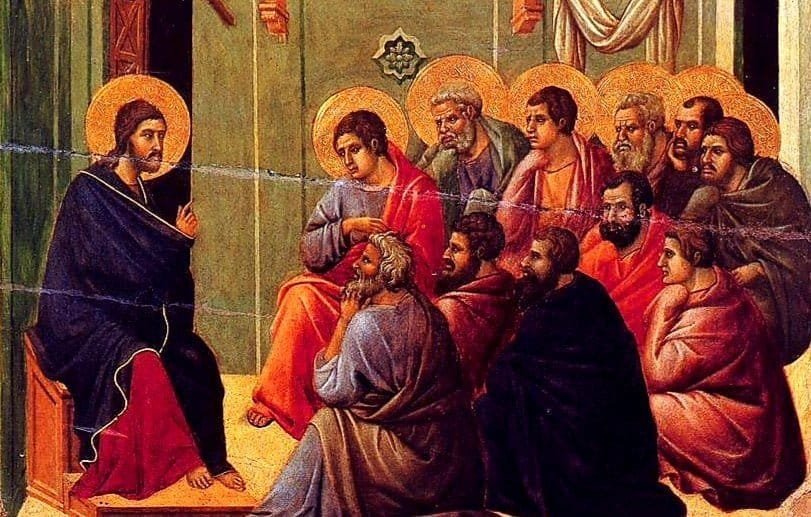DAILY GOSPEL COMMENTARY: FRATERNAL CORRECTION (Mt 18:15–20).
Gospel of Wednesday,
19th week in Ordinary Time (Mt 18:15–20)
Jesus said to his disciples: “If your brother sins against you, go and tell him his fault between you and him alone. If he listens to you, you have won over your brother. If he does not listen, take one or two others along with you, so that every fact may be established on the testimony of two or three witnesses. If he refuses to listen to them, tell the Church. If he refuses to listen even to the Church, then treat him as you would a Gentile or a tax collector. Amen, I say to you, whatever you bind on earth shall be bound in heaven, and whatever you loose on earth shall be loosed in heaven. Again, amen, I say to you, if two of you agree on earth about anything for which they are to pray, it shall be granted to them by my heavenly Father. For where two or three are gathered together in my name, there am I in the midst of them.”
Gospel Commentary from the Navarre Bible, Commentary to the Gospel of St. Matthew (with permission)
- 15-17 Here our Lord calls on us to work with him for the sanctification of others by means of fraternal correction, which is one of the ways we can do so. He speaks as sternly about the sin of omission as he did about that of scandal (cf. Chrysostorn, [Join, on St Matthew, 61).
- There is an obligation on us to correct others. Our Lord identifies three stages in correction:
- 1) alone;
- 2) in the presence of one or two witnesses; and
- 3) before the Church.
- The first stage refers to giving scandal and to secret or private sins; here correction should be given privately, just to the person himself, to avoid unnecessarily publicizing a private matter and also to avoid hurting the person and to make it easier for him to mend his ways.
- If this correction does not have the desired effect, and the matter is a serious one, resort should be had to the second stage – looking for one or two friends, in case they have more influence on him.
- The last stage is formal judicial correction by reference to the Church authorities. If a sinner does not accept this correction, he should be excommunicated, that is, separated from communion with the Church and its sacraments.
- There is an obligation on us to correct others. Our Lord identifies three stages in correction:
- 18 This verse needs to be understood in connexion with the authority previously promised to Peter (cf. Mt 16:13-19): it is the hierarchy of the Church that exercises this power given by Christ to Peter, to the Apostles and their lawful successors — the Pope and the Bishops.
- 19-20 “Ubi caritas et amor, Deus ibi est: where charity and love resides, there God is”, the Holy Thursday liturgy entones, drawing its inspiration from the sacred text of 1 Jn 4:12.
- For it is true that love is unconceivable if there is only one person: it implies the presence of two or more (cf. Aquinas, Commentary on St Matthew, 18:19-20).
- And so it is that when Christians meet together in the name of Christ for the purpose of prayer, our Lord is present among them, pleased to listen to the unanimous prayer of his disciples:
- “All those with one accord devoted themselves to prayer, together with the women and Mary the mother of Jesus” (Acts 1:14). This is why the Church from the very beginning has practised communal prayer (cf. Acts 12:5). There are religious practices – few, short, daily “that have always been lived in Christian families and which I think are marvelous — grace at meals, morning and night prayers, the family rosary (even though nowadays this devotion to our Lady has been criticized by some people). Customs vary from place to place, but I think one should always encourage some acts of piety which the family can do together in a simple and natural fashion” (St. Josenaria, Conversations, 103).
VIDEO COMMENTARY ON TODAY’S GOSPEL
TOPIC: HOW SHOULD YOU RESOLVE A CONFLICT WITH SOMEONE?
In today’s gospel reading, we reflect on Jesus’ teaching on how to resolve conflicts, particularly with a brother or sister who has wronged us. Jesus has always taught us that He desires unity among us. He prayed this to His father in heaven in the Last Supper. And He asked this not just once but four times, to emphasize unity as primordial in a community of believers (John 17:20-23).He knows that conflicts will arise among us and He advises us today that reconciliation should be our goal when disagreements become unwieldy. He wants us to strive for unity because this is essential to fulfill God’s greatest commandment of love.
TOPIC: How do you resolve a conflict situation between you and another person?
Stay updated: subscribe by email for free TO OUR NEW WEBSITE www.catholicsstrivingforholiness.org (PUT YOUR EMAIL IN THE SUBSCRIBE WIDGET).
We are also in www.fb.com/Catholicsstrivingforholiness. Kindly help more people in their Christian life by liking our page and inviting your family, friends and relatives to do so as well. Thanks in advance and God bless you and your loved ones! Fr. Rolly Arjonillo
